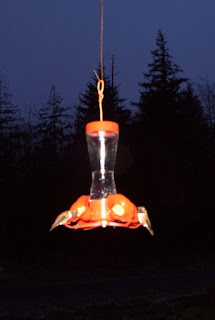Three nest boxes went up on Sunday. Before that, however, the cages came down and were thoroughly cleaned, including laundering the skirts, and cleaning nearby windows, walls and counter. Smile. Boxes are also clean and have new pine shavings inside.
 |
Removing Duct tape that covered the hole after a nest box
came down last year. Clean and ready, they're going back up. |
 |
Husband preparing nest box opening as Rosie watches eagerly.
|
The side of a cardboard box between cages keeps males from strutting and warning one another away instead of focusing on their mates. I leave it off except when they're preparing to mate or raise young.
Clyde sitting outside his nest box while Rosie is inside, just four days after the boxes went up.
I expect that she will be the first to lay and hatch eggs.
 |
Rosie in a box with a sliding door on the side.
She's rearranging the pine shavings to her liking. |
Fuchsia has been quickly in and out of her box. However, Cherry, who is much older than the other hens, has peeked in but not ventured inside yet. She and Rhett are interested, but for several years now I have wondered whether it would be their last year to reproduce. They've surprised me by continuing as long as they have. I limit them to one or two clutches a season because of their advanced age.
 |
Flame and Fuchsia immediately after the box was attached.
Actually, Fuchsia kept landing on my husband's arm and
tried to see into the box while he tried to install it. |
 |
Fuchsia getting a closer look at the box opening. Taken
before she'd been inside. She has been since. |
 |
Three boxes on four cages. Two in front, one off to right side.
Birds in lower right are young and still unmatched, or unmated. |
Limit the number of clutches you allow your birds to have in a 12-month cycle. Bourkes go right back to lay more eggs shortly after their last clutch has left the nest, and often even before they are completely weaned (eating on their own). Dad's take over the feeding when Mom goes back into the nest to start another clutch.
Young birds can tolerate three clutches a year if adequately fed and watered. Laying hens drink lots of water, so keep it fresh and readily available, both for drinking and bathing. Clean boxes between clutches if you can. I've even removed eggs, cleaned a box and put them back without a problem. Better to get it cleaned as soon as the babies leave it, however -- before new eggs are laid.
Although I clean cages often, once a year I take them down, let the birds out and clean EVERYTHING in or on the cages. Also clean all around them...counters, walls and windows. Skirts designed to catch extra seed are shaken out and laundered before being put back. I like to have everything very clean before the birds go back to raising their families. Odds are, I'll do this process again in the Fall.
Peace and Blessings.
May all your eggs hatch and your birds produce beautiful, healthy babies!
















